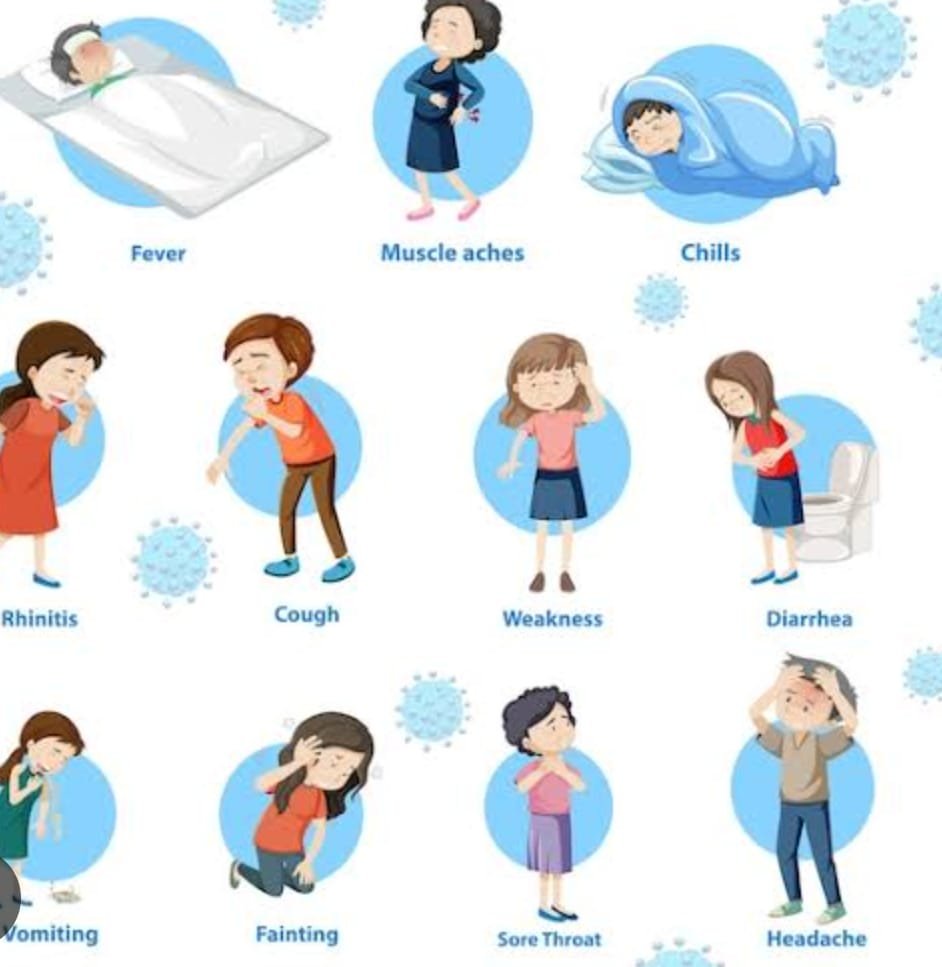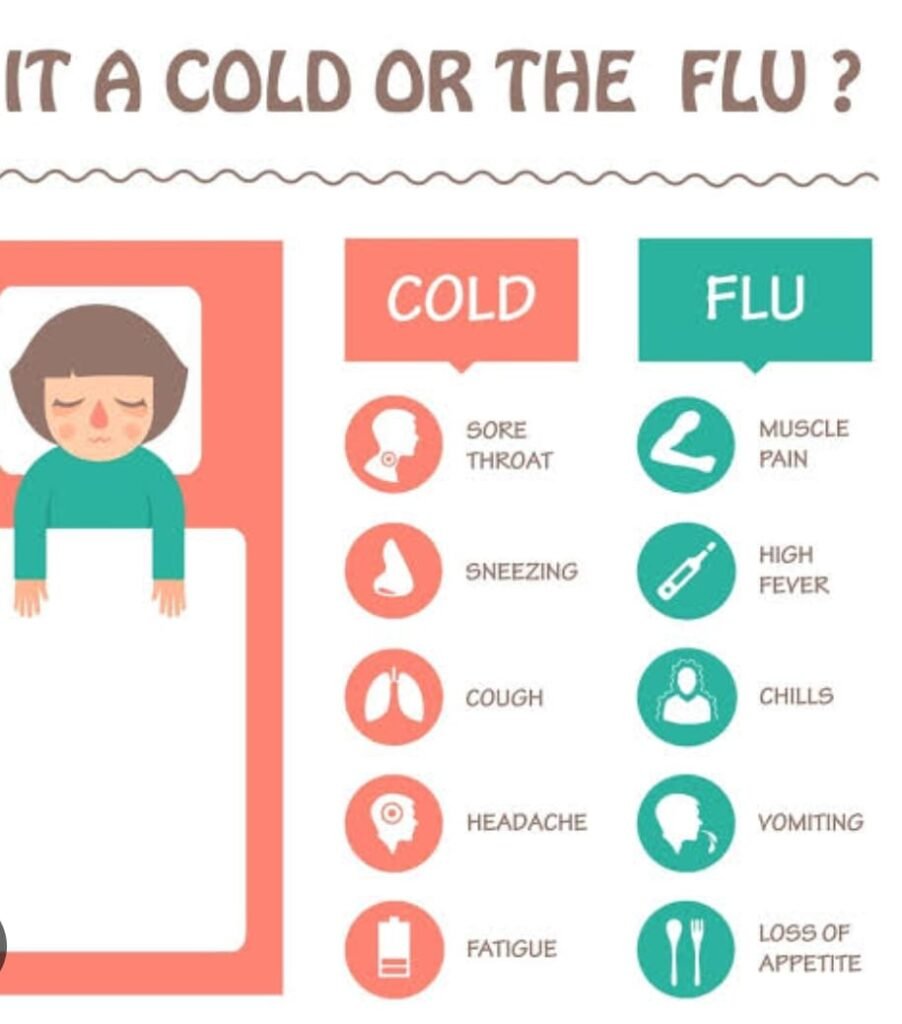WHAT IS FLU

Influenza, commonly known as the flu, is a contagious respiratory illness caused by influenza viruses. It can result in mild to severe symptoms and, in some cases, lead to serious complications or hospitalization. Symptoms include fever, cough, sore throat, body aches, and fatigue. The flu is spread through respiratory droplets when an infected person coughs or sneezes. Vaccination is a key preventive measure against the flu.
SYMPTOMS OF FLU
Common symptoms of the flu include:
- Fever: Often high, but not always present.
- Cough: Can be persistent and severe.
- Sore throat: Irritation or pain in the throat.
- Body aches: Muscles and joints may ache.
- Fatigue: Feeling very tired and weak.
- Headache: A persistent, throbbing pain.
- Chills: Shivering or feeling cold.
- Runny or stuffy nose: Nasal congestion.
It’s important to note that symptoms can vary in severity, and some people, especially children or those with underlying health conditions, may experience more serious complications. If you suspect you have the flu, it’s advisable to consult with a healthcare professional for guidance.

TRANSMITTED THROUGH
The flu is primarily spread through respiratory droplets produced when an infected person talks, coughs, or sneezes. The main modes of transmission include:
- Airborne Transmission: Inhaling respiratory droplets containing the flu virus that are released into the air when an infected person talks, coughs, or sneezes.
- Direct Contact Transmission: Touching a surface or object contaminated with the flu virus and then touching the mouth, nose, or eyes.
- Indirect Contact Transmission: Coming into contact with respiratory droplets on surfaces or objects and then transferring the virus to the mouth, nose, or eyes.
The flu virus can also spread before a person shows symptoms, making it challenging to prevent transmission entirely. Practicing good respiratory hygiene, such as covering your mouth and nose when coughing or sneezing, and maintaining good hand hygiene by washing hands frequently, are crucial in preventing the spread of the flu. Additionally, getting vaccinated helps reduce the likelihood of both contracting and spreading the virus.
TREATMENT OF FLU
Treatment for the flu typically involves:
- Rest: Get plenty of sleep to help your body recover.
- Hydration: Drink fluids to stay well-hydrated, which can help with symptoms.
- Pain relievers and fever reducers: Over-the-counter medications like acetaminophen or ibuprofen can alleviate discomfort and reduce fever.
- Antiviral medications: Prescription antiviral drugs may be recommended, especially for those at high risk of complications.
It’s crucial to consult with a healthcare professional for personalized advice and to determine if antiviral medications are necessary. Additionally, individuals with severe symptoms or at higher risk of complications should seek medical attention promptly. Vaccination is a preventive measure and can reduce the severity of the illness if contracted.

PREVENTION FROM FLU
Preventive measures to reduce the risk of contracting and spreading the flu include:
- Vaccination: Annual flu vaccination is the most effective way to protect yourself and others.
- Hand Hygiene: Wash hands frequently with soap and water, or use an alcohol-based hand sanitizer.
- Respiratory Hygiene: Cover your mouth and nose with a tissue or your elbow when coughing or sneezing.
- Avoid Touching Face: Avoid touching your eyes, nose, and mouth with unwashed hands.
- Clean and Disinfect: Regularly clean and disinfect commonly-touched surfaces, especially if someone is sick.
- Stay Home when Sick: If you have flu-like symptoms, stay home to avoid spreading the virus to others.
- Avoid Close Contact: Try to avoid close contact with sick individuals.
- Healthy Lifestyle: Maintain a healthy lifestyle with proper nutrition, exercise, and adequate sleep to support your immune system.
By incorporating these practices into your routine, you can reduce the likelihood of getting the flu and help protect those around you.
RISK FACTORS
Several factors can increase the risk of experiencing severe complications from the flu. These risk factors include:
- Age: Young children, especially those under 5 years old, and adults aged 65 and older are at a higher risk.
- Underlying Health Conditions: Individuals with chronic conditions such as asthma, diabetes, heart disease, or weakened immune systems are more susceptible to complications.
- Pregnancy: Pregnant women are at an increased risk of severe illness from the flu and have a higher chance of complications.
- Weakened Immune System: Conditions or medications that weaken the immune system, such as certain cancers or immunosuppressive drugs, can increase vulnerability.
- Obesity: People with a body mass index (BMI) of 40 or higher may face a higher risk of severe flu complications.
- Residential Setting: Those living in long-term care facilities or nursing homes are at an increased risk due to close living quarters.
It’s important for individuals in high-risk groups to take extra precautions, including getting an annual flu vaccine, to protect themselves from severe illness. If you have specific concerns or questions about your risk factors, consulting with a healthcare professional is advisable.


I am a content writer I have experience been writing news and blog articles for 5 years.